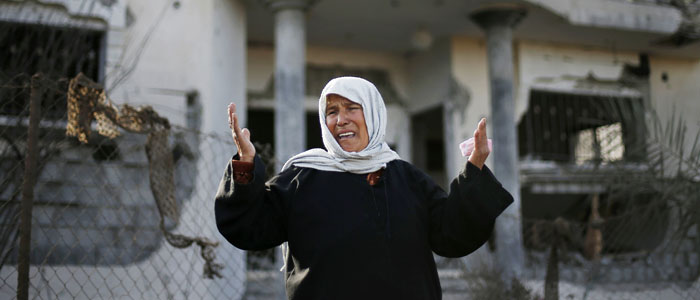
After nearly a month of low-level fighting between Israel and Palestinian militants in the Gaza Strip, the situation erupted into a fully-fledged conflict on November 14, following the death of Ahmed Jabari, military chief of the Islamic Hamas movement, in an Israeli airstrike. Hamas, which governs the Gaza Strip, and other militant groups responded with rocket attacks on Israeli towns and cities, launching some 275 missiles in the first 24 hours. For the first time ever, some reached as far as the southern suburbs of Tel Aviv (Holon and Rishon Lezion). Three Israelis have been killed. On the Palestinian side, 16 people have been killed so far, with the Israeli Air Force reportedly attacking some 250 targets.
In many respects, the current situation looks very similar to December 2008 when a tacit ceasefire between Israel and Hamas unraveled, and Israel launched its Cast Lead offensive against Gaza. In both cases Israel was in the middle of an election campaign (voting is scheduled this time for January 22), making its political leadership more sensitive than usual to protecting its citizens against rocket attacks out of Gaza.
 New regional and global dynamics
New regional and global dynamics
The regional and global dynamics have changed dramatically in the past four years and, on balance, will serve to restrain Israel from entangling itself in a land operation that would inevitably result in heavy casualties and material damage, particularly on the Palestinian side.
The first and most important change is that Egypt is now ruled by an Islamist government. In contrast to the years when Hosni Mubarak was president, Cairo can no longer be counted on to quietly support Israel vis à vis Hamas. Instead, there is a significant risk that it may use the pretext of Israel’s military confrontation with Hamas to downgrade its relations with Israel. On the first day of the fighting, Egypt recalled its ambassador and took other, symbolic, measures in protest against Israeli actions.
Hamas traces its roots to the Egyptian Muslim Brotherhood, whose Freedom and Justice Party now rules Egypt. Popular opinion in Egypt is hostile to Israel and freer than in the past to make its views heard. However, the degree to which the Egyptian government will be willing to back Hamas should not be overstated. The country is preoccupied with domestic issues and is reliant on U.S. and Western help to see it through its economic crisis.
“It appears that neither Israel nor Hamas want the fighting to evolve into a lengthy conflict or one that would draw Israeli troops into Gaza itself.” – Pratibha Thaker, Economist Intelligence Unit
Similarly, Israel’s relations with the White House are chillier than they were during Cast Lead, when George W. Bush was the U.S. president and Israel was ruled by a center-left government headed by Ehud Olmert. The current Israeli prime minister, Benjamin Netanyahu, and the recently re-elected U.S. president, Barack Obama, have had strained personal and political relations over the last few years regarding policy towards both the Palestinians and Iran. With the U.S. presidential election now safely out of the way, Obama’s response to Israel’s military onslaught against Hamas in Gaza will give the first clear indication of the line which his administration will adopt more generally towards Israel during his second term. The initial signs are that the U.S. will continue to back Israel; although a statement issued by the White House on November 14 called on Israel to “make every effort to avoid civilian casualties” it importantly refrained from asking Israel to end its operations. The statement, in fact, put the onus on Hamas to end the fighting.

A Palestinian firefighter tries to extinguish a fire after an Israeli air strike on the building of Hamas' Ministry of Interior in Gaza City November 16, 2012 (Reuters).
Hezbollah unlikely to intervene
Regionally, the political situation in the Middle East has become much more precarious in the wake of the Arab Spring. The Hezbollah movement in Lebanon is the most likely regional faction to intervene, probably via missile attacks on Israel. Both Hezbollah and Hamas are allies of Iran and Hezbollah draws much of its legitimacy from being part of the so-called resistance movement against Israel. But entangling itself in the Gaza conflict could easily provoke an Israeli attack on Lebanon at a time when Hezbollah has already been weakened by the civil war taking place in Syria, another of its key allies. Over the last week, Syrian fighting has spilled over the border into Israel, but that appears to have been accidental and does not signal an attempt by the Syrian president, Bashar al-Assad, to draw Israel into a conflict.
Militarily, both Israel and Hamas enter the fighting with assets they did not have four years ago. For the protection of its cities, Israel has installed four Iron Dome anti-missile defense systems, which intercepted 105 rockets in the first 24 hours of the fighting (the system tracks the trajectory of incoming projectiles but does not intercept those headed for open areas). The killing of Jabari and the targeting of Hamas installations suggest that Israeli intelligence on Gaza is very strong. Israeli morale is higher than it was in the run-up to Cast Lead, which had been overshadowed by the botched Lebanon offensive in 2006. Against that, Hamas is presumed to have a bigger rocket arsenal than it did in 2008; it now includes the Iranian Fajr 5 missile, whose 70-kilometer range can reach Tel Aviv, Israel’s commercial center. Some of the Fajr 5 rockets were destroyed in an Israeli raid, but militants claimed on November 15 to have used the missiles in the attacks on the Tel Aviv suburbs.

Israelis move the body of one the three people killed by a rocket fired from Gaza, from a car before his funeral at a cemetery in the southern city of Kiryat Malachi November 15, 2012 (Reuters).
The Israeli elections are probably less of a factor than is widely assumed. Although Netanyahu has taken a hard line with respect to fresh peace talks with the Palestinians whilst routinely issuing warnings implying Israeli readiness to attack Iran, his two terms as prime minister provide little support for the view that he is a war-monger. As recently as a month ago, he defended his record by pointing out that his predecessor, Ehud Olmert, had led Israel into two wars while no major conflicts had occurred during the time that he was in office. Instead, concerns about socio-economic issues have played a much bigger role, at least in the early part of the election campaign (with polls showing that Netanyahu does not score highly in this particular regard). In addition, a war is politically risky because the public does have an appetite for a drawn-out conflict. Any failures in strategy or operations could easily boomerang on Netanyahu and his Likud party.
Neither Israel nor Hamas will want a protracted conflict
It appears that neither Israel nor Hamas want the fighting to evolve into a lengthy conflict or one that would draw Israeli troops into Gaza itself. Nonetheless, the risk remains that neither side will be able to control events. The Jihadist groups that have grown and thrived in Gaza in the last few years are not fully answerable to Hamas nor are they easily controlled. Jabari’s assassination may weaken Hamas’ ability to keep them in line. A single rocket that causes heavy civilians casualties in Israel or strikes Tel Aviv would give Israel’s political leadership little choice but to escalate the conflict. Israel can count on U.S. backing, at least initially, but this support will be conditioned on limited Palestinian casualties. Egypt will certainly engage in tougher rhetoric than it did in the past and may feel more public pressure to act, but is does not have the military resources or the diplomatic standing to intervene in any significant way. Its single biggest asset is Israel’s concern to ensure that bilateral ties do not deteriorate or, in a worst case, fracture completely.
This post has been authored exclusively for MEV by Economist Intelligence Unit
The views expressed in this Insight are the author’s own and are not endorsed by Middle East Voices or Voice of America. If you’d like to share your opinion on this post, you may use our democratic commenting system below. If you are a Middle East expert or analyst associated with an established academic institution, think tank or non-governmental organization, we invite you to contribute your perspectives on events and issues about or relevant to the region. Please email us through our Contact page with a short proposal for an Insight post or send us a link to an existing post already published on your institutional blog.
Pratibha Thaker
Pratibha Thaker is regional director, Middle East & Africa for the Economist Intelligence Unit (EIU).